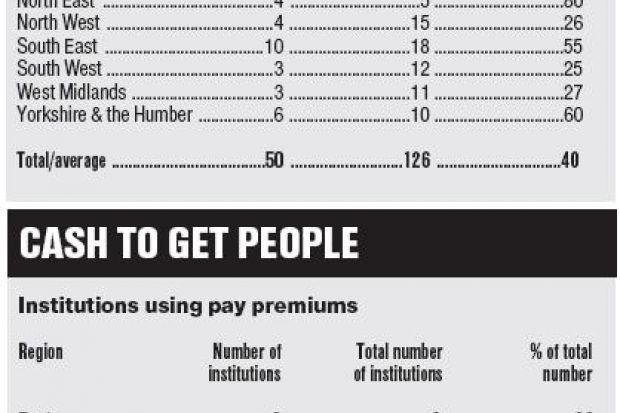Golden hellos and perks lure the high-flyers in a fiercely competitive market, reports Anna Fazackerley
Universities are having to offer pay premiums and special packages to attract and retain top staff in a fiercely competitive market, according to a government report.
The study reveals a booming jobs market, with the number of academics employed set to rocket by as much as 25 per cent between 2004 and 2011 to cope with the Government's projections for increased student numbers.
The findings come from the first in-depth look at the university workforce in England by the Higher Education Funding Council for England, a study prompted by Ruth Kelly, former Education Secretary.
It shows that institutions are increasingly using financial incentives to woo or keep staff, including salary bonuses, "golden hellos" and retention payments.
But how much money an academic gets can depend on geographical location.
Two thirds of institutions in the North West reported using "market factor supplements" - boosts to salary to keep pace with the market in a certain discipline, particularly where the number of applications is down. But only one quarter of universities in the South West said that they used such incentives.
Retention payments also vary widely. In the North East, 80 per cent of institutions reported offering bonuses to keep people. Yet in London, just 32 per cent of universities needed to do so, and in the South West, the figure was only 25 per cent.
James Sterling, pro vice-chancellor for research at Durham University, said: "We realise that it will cost us more to get the international research superstars and, conversely, that we will have to work harder to keep them."
He added: "If you hire people at reader level, the danger is that they are ambitious and sooner or later they will be thinking about chairs and other institutions will be looking at them."
But he said that there was no blanket retention package, and while Durham would strive to keep the best employees, the university would not automatically match any pay offer.
Garry Coupland, assistant director of human resources at Newcastle University, said: "We are developing a policy on market-related supplements. We might look at the base salary wherever there is evidence that we have a problem in recruiting."
He said that the university would consider a retention package to keep valuable staff. But he added: "A degree of turnover is good for the university and the sector. Talent does move around."
Alex Acland, a higher education headhunter for Odgers, Ray and Berndtson, said that universities were having to be more generous with the packages they offered to lure top candidates.
He said: "Universities have to think much more creatively. We get the client to think not only about the personal package - salary, perhaps a house - but also what the university can do to make the job more attractive, such as a promise of major investment in their area."
He added: "If you are looking at the star researchers, who are like gold dust, universities are getting much cleverer about how they do this."
One dean of medicine said: "It is very rare that someone doesn't negotiate on their package now. They want to know if they can get more money, or removal expenses, or something special for their research."
According to the Hefce report, half of all institutions have had difficulty recruiting certain staff. Recruitment problems are most common in professional subjects, including finance, business, information technology, law, healthcare and teacher training.
It warns that the supply of PhD students, who represent vital new academic blood, may decline if more graduates are put off postgraduate study because of increasing levels of debt.
Hefce may undertake further research into the impact of debt when the new top-up fee structure has bedded in.
The report says that if government projections of student growth are realised, the sector's wage bill in 2011 will need to be about 20 per cent higher than in 2003-04. This is before adjustment for cost of living or implementation of the pay framework.
It says there would need to be a major expansion of jobs in social policy, engineering, biological sciences and medicine.
But Katie Petty-Saphon, executive director of the Council of Heads of Medical Schools, said: "If someone were to give us money for 15 per cent more posts in medical schools, many would find it difficult, if not impossible, to fill them. We need to push new people into the system. We can't suddenly magic 100 new professors out of nowhere."
anna.fazackerley@thes.co.uk </a>
Register to continue
Why register?
- Registration is free and only takes a moment
- Once registered, you can read 3 articles a month
- Sign up for our newsletter
Subscribe
Or subscribe for unlimited access to:
- Unlimited access to news, views, insights & reviews
- Digital editions
- Digital access to THE’s university and college rankings analysis
Already registered or a current subscriber?
